Mentoring for Translators and Interpreters
SURVEY RESULTS - Analysis of the answers
PART II: MENTOR
Past Experience (Mentor)
After having answered positively to Question 5, 167 participants were directed to this section.
Question 8: As a mentor, which subjects did you deal with?
Out of the 167 participants, who had acted as mentor in the past, 149 answered this question.
Most of them were mentors in translation skills (59) or in both the linguistic and business domains at the same time (54). Only 7% of them were mentors only in interpretation skills (10) and 9% purely in business matters (14).
There is no accurate information on the other sectors having been mentored (12).
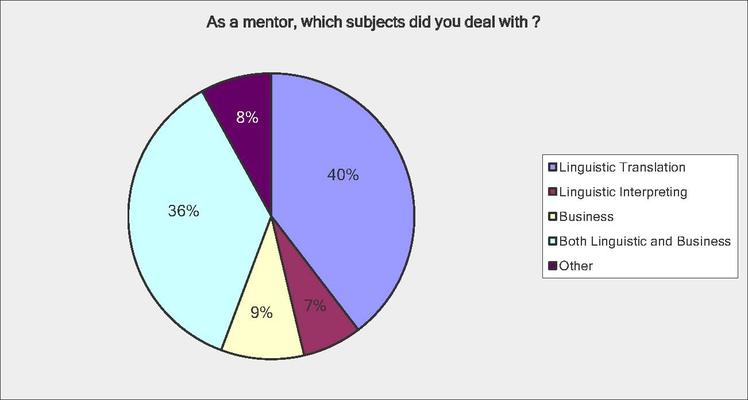
Please note that out of those 149 respondents, none skipped any of the following questions in this section, regarding past experience.
Question 9: Under which circumstances did you become a mentor?
Most of the respondents (56) accepted to help another professional. An important part of the mentors also work as teachers (34 or 23%) and a few are freelancers, affiliated with the academic sector (9). Some company owners also take on new freelancers (16), and only one person defined himself as a professional coach (1).
We do not have details on the other circumstances that prompted participants to become mentors, although the results indicate that many other reasons might motivate people to play this role (33), representing a significant 22%.
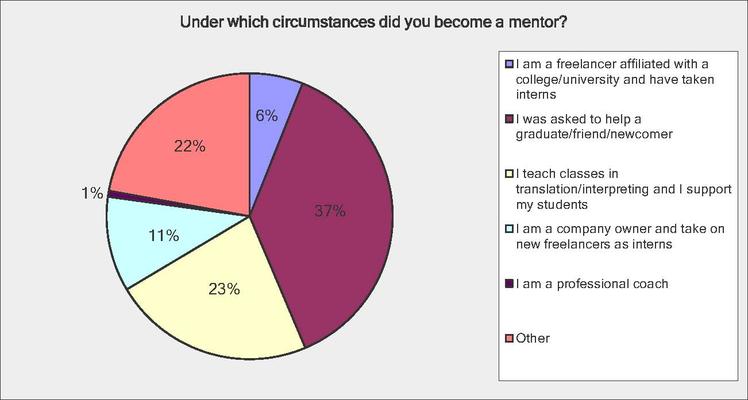
Question 10: How many times have you been a mentor?
Most of the mentors endorsed these responsibilities between two and five times (55). Many of them did so only once (39) or on the contrary, more than ten times (38). The rest of them supervised people between six and ten times (17).
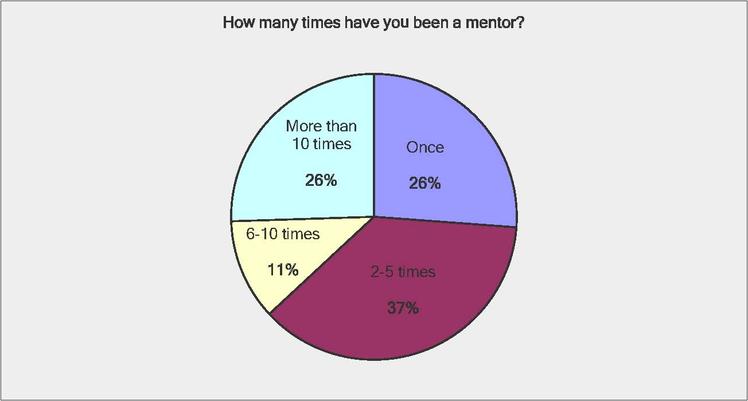
Question 11: Are you able to supervise several mentees/interns at the same time?
Two thirds of the respondents feel able to supervise several people at the same time. Many of them had already managed to do so (58 equalling to 39%), while the others had had only one mentee at a time so far (40). Some of these mentors would be eager to try this mentoring method (19), but a significant number of them would rather not do it this way (32).
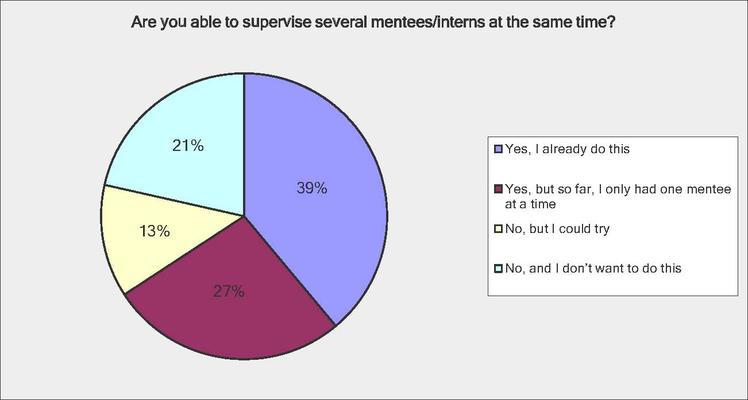
Question 12: What do you enjoy in mentoring?
(multiple choices)
80% of respondents enjoy supporting other freelancers in order to advance their careers (119). An equivalent number of respondents find that this activity also helps them to keep their skills up-to-date (66, or 44%) or even to create new opportunities for future partnerships (69, or 46%). Several participants (27) also selected the last option “Other”, but we only have a few reasons mentioned, such as:
- Sharing know-how and business knowledge
- Passing on working methods as well as tips and advice to avoid making mistakes as newcomers
- Jointly develop skills, experience and knowledge
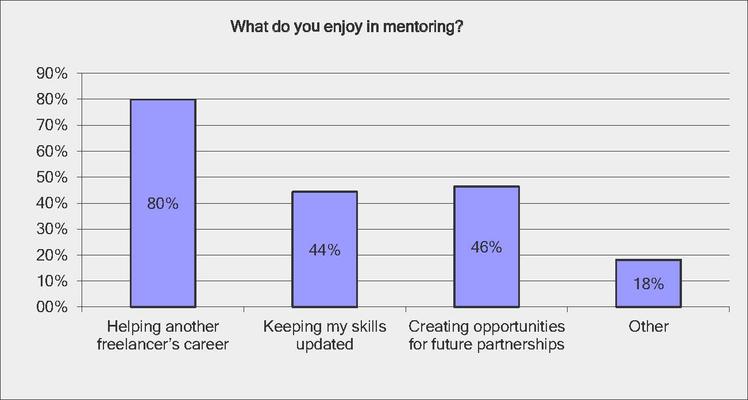
Question 13: What do you dislike about mentoring?
(multiple choices)
Nearly half of the mentors (69) do not like the idea of mentoring someone, who does not share the same quality criteria as themselves. A quarter of them also thinks that this means extra work for them (34). Some do not feel at ease with the responsibility (17) or believe that mentees might have high expectations and demands (18). People are also concerned that their involvement is unpaid (19) and even that some mentees might end up stealing part of their business (18).
This question offered the opportunity to explain other reasons why one dislikes mentoring. People having chosen this option (31) mentioned reasons like:
- Mentees not making enough effort (5)
- Not being able to be a good mentor (3)
- Mentoring is exhausting and takes a lot of energy (3)
- Different expectations of mentee and mentor (1)
- Having met narrow-minded mentors, who abuse the mentoring program to push their outdated views on the mentees (1)
- Having heard negative comments about mentoring (1)
- The payment is never enough (2)
- After having run a mentoring scheme, it is clear that paying a nominal fee helped motivate the mentors (1)
- All reasons proposed in the options may happen (1)
- Finally, 14 of the respondents here used this text field to indicate that they do not dislike anything in mentoring or to emphasize the fact that mentoring is a win-win situation that might be potentially rewarding to them
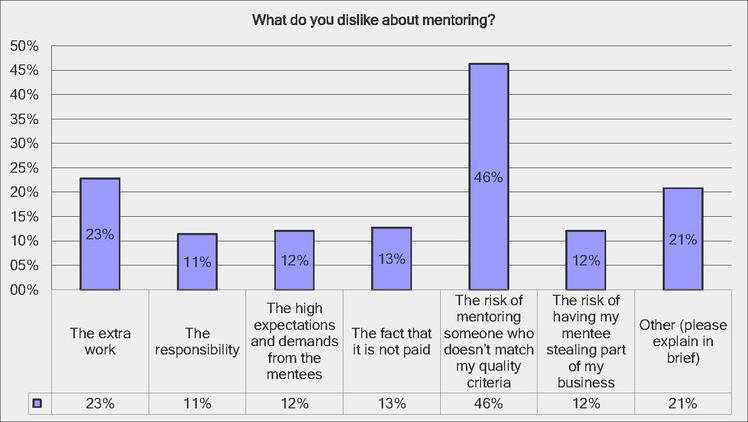
Question 14: How much time a week do you dedicate to mentoring?
Here, most of the respondents answered between two and five hours a week (46) although these results are closely followed by a group, spending less than one hour a week (42), and by those dedicating around one hour per week to this extra activity (38). Some people, however, are able to spend more than five hours per week on mentoring (20) and only 3 follow an interpreting assignment a month.
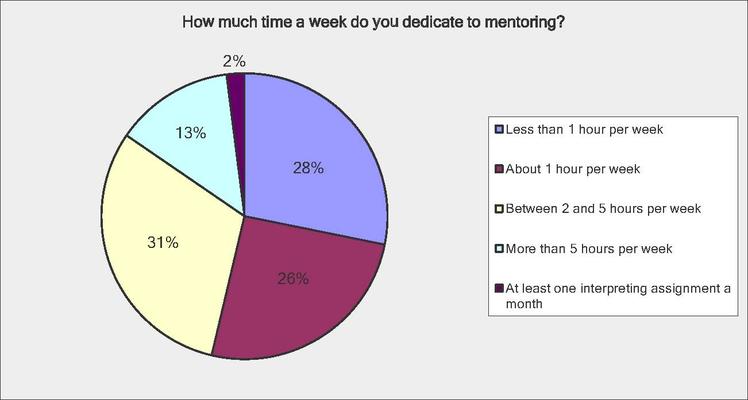
Future or Continuing Mentoring (Mentor) >
